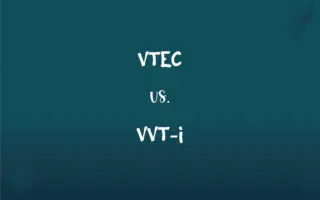Teachers vs. Masters: What's the Difference?
Edited by Aimie Carlson || By Janet White || Published on March 14, 2024
Teachers impart knowledge and guide learning; masters are experts in a field or hold an advanced degree.

Key Differences
Teachers are professionals who educate, mentor, and guide students across various stages of learning, focusing on imparting knowledge, developing skills, and fostering intellectual growth. Masters, in contrast, can refer to individuals who have achieved a high level of expertise in a particular discipline or those who have earned a master's degree, signifying advanced study in a specific field. While teachers play a crucial role in the educational process, masters denote a level of mastery or academic achievement.
The role of teachers extends beyond mere instruction; they also inspire, engage, and encourage students to think critically and independently. Masters, when referred to as experts, embody the pinnacle of understanding and skill within their domain, often serving as sources of inspiration or as benchmarks of professional excellence. In the academic context, a master’s degree holder has undergone rigorous postgraduate study, equipping them with specialized knowledge and research capabilities.
Teachers operate within educational institutions, including schools, colleges, and universities, contributing to the academic and sometimes personal development of their students. Masters, in the sense of degree holders, have completed advanced education beyond the undergraduate level, focusing on a specific area of study, which may qualify them for higher-level professional roles, research positions, or academic careers. The expertise of masters can also influence teaching, as they may bring a depth of knowledge to educational settings.
In the traditional sense, teachers are seen as facilitators of learning, using a variety of pedagogical techniques to convey subject matter and essential life skills. Masters, particularly those recognized as experts or mentors in non-academic contexts, such as crafts, arts, or martial arts, offer deep insights and advanced training, guiding learners towards achieving a high degree of proficiency. This distinction highlights the diverse contexts in which teaching and mastery manifest, reflecting the breadth of learning and development opportunities available.
Understanding the difference between teachers and masters enriches our appreciation for the spectrum of education and expertise. Teachers lay the foundation for lifelong learning and critical thinking, while masters, whether as expert practitioners or holders of advanced degrees, represent the attainment of specialized knowledge or skill. Both roles are vital in the continuum of education and professional development, each contributing uniquely to the growth and enrichment of individuals and communities.
ADVERTISEMENT
Comparison Chart
Role
Educators and mentors
Experts or advanced degree holders
Function
Impart knowledge and foster development
Demonstrate high-level expertise or scholarship
Context
Academic and educational settings
Professional fields or postgraduate education
Objective
Guide learning processes
Represent mastery or advanced understanding
Outcome
Intellectual and skill development
Specialized knowledge or professional proficiency
ADVERTISEMENT
Teachers and Masters Definitions
Teachers
Educators responsible for imparting knowledge.
Our teachers ensure we understand complex concepts clearly.
Masters
Holders of an advanced academic degree.
She became a master in her field after years of study.
Teachers
Professionals who assess and evaluate student progress.
Teachers provide feedback on assignments to aid learning.
Masters
Those who have achieved mastery through experience.
Masters of the craft often have decades of experience.
Teachers
Facilitators of classroom engagement and discussion.
Teachers encourage active participation in class.
Masters
Experts with extensive knowledge in a specific field.
Masters in their fields often contribute groundbreaking research.
Teachers
Individuals who guide and facilitate learning.
Teachers play a pivotal role in shaping students' futures.
Masters
Individuals who demonstrate superior skills or artistry.
The master painter’s work is renowned worldwide.
Teachers
Mentors who inspire and motivate learners.
Great teachers not only teach; they inspire.
Masters
Recognized authorities or mentors in specific disciplines.
He is considered a master in the art of negotiation.
Teachers
One who teaches, especially one hired to teach.
Masters
Plural of master
Teachers
Plural of teacher
Masters
A master's degree.
Masters
United States poet (1869-1950)
FAQs
What is the difference between a master’s degree and a teacher's certification?
A master’s degree is an advanced academic qualification, while a teacher’s certification is a professional credential to teach.
Are masters always involved in teaching?
Not always, but many choose to share their expertise through teaching.
Can teachers also be masters?
Yes, if they possess expert knowledge or hold advanced degrees.
How do teachers contribute to society?
They educate the next generation, fostering knowledge, skills, and critical thinking.
What impact do teachers have on individual students?
They can significantly influence students’ understanding, motivation, and future paths.
Can someone be considered a master without formal education?
Yes, through extensive experience and recognition by peers.
What is the main role of a teacher?
To educate, mentor, and facilitate learning for students.
What fields can masters specialize in?
Any, including arts, sciences, business, or professional practices.
What role do masters play in academia?
They contribute to research, scholarship, and high-level teaching.
What qualifies someone as a master?
Achieving expert status in a field or earning a master's degree.
Do all teachers have a master’s degree?
Not necessarily, but many pursue advanced degrees for professional development.
What makes a master in a craft or profession?
Exceptional skill, knowledge, and often years of experience.
Is the role of teachers changing in modern education?
Yes, increasingly incorporating technology and adapting to diverse learning needs.
How do masters contribute to innovation?
Their expertise and deep knowledge drive innovation and discovery in their fields.
Do masters in arts and crafts also teach?
Many do, sharing their skills and techniques with novices and enthusiasts.
How can one transition from being a teacher to a master?
Through continued learning, research, practice, and achieving recognition for excellence in their field.
How does one become a teacher?
Through specific educational pathways, including obtaining a degree and teacher certification.
What qualities make an effective teacher?
Patience, knowledge, empathy, and the ability to engage and inspire students.
Can masters be mentors?
Yes, they often mentor others, guiding them towards achieving expertise.
What distinguishes a good teacher from a master?
Mastery implies a higher level of expertise, while good teaching focuses on effective knowledge transmission.
About Author
Written by
Janet WhiteJanet White has been an esteemed writer and blogger for Difference Wiki. Holding a Master's degree in Science and Medical Journalism from the prestigious Boston University, she has consistently demonstrated her expertise and passion for her field. When she's not immersed in her work, Janet relishes her time exercising, delving into a good book, and cherishing moments with friends and family.
Edited by
Aimie CarlsonAimie Carlson, holding a master's degree in English literature, is a fervent English language enthusiast. She lends her writing talents to Difference Wiki, a prominent website that specializes in comparisons, offering readers insightful analyses that both captivate and inform.







































































